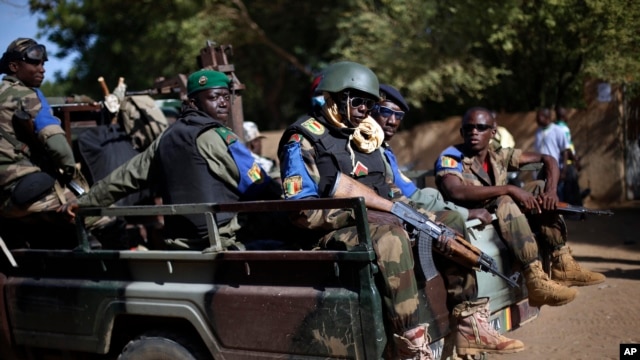The Economic Community of West African States and its local and
international partners are to meet Monday in Ghana to review the
regional bloc’s intervention in Mali, says Abdel-Fatau Musah, ECOWAS
director for political affairs.
The ECOWAS international partners expected to be at the conference include the United Nations, the European Union and the African Union (AU).
“The experts will review what ECOWAS sees as the outcome of its role in trying to help Mali overcome its multidimensional crisis, and most importantly, what lessons can be learned from that exercise in order to improve the ECOWAS Peace and Security Architecture,” said Musah.
Musah also says the meeting will look at ways of raising funds to support a planned regional standby force that could be quickly deployed within 30 days following security crisis in the West African region.
He acknowledged that both the ECOWAS and the AU have been unable to establish a standby force that could be rapidly deployed to countries faced with security challenges.
Musah says the two groups lack a strategic “lift capacity” like aircraft and other logistical equipment needed to help quickly deploy a standby force.
He cited some of the challenges ECOWAS and AU face in establishing a standby force.
“The standby forces as they are currently conceptualized do not actually constitute standby forces, but it is pledged forces, which may not be ready in the member states at the time of an emergency crisis,” said Musah.
But Musah says the conference in Ghana will also focus on expediting the process of establishing a regional standby force.
“The purpose of the meeting is to see how we can scale up efforts towards operationalizing the ECOWAS standby force. In particular, its military, police and civilian component so that it will be ready,” said Musah.
“We are thinking of the possibility of setting up a special two battalion commando brigade that will be very well equipped and on standby and should be able to intervene in any theater of operation within 30 days of the eruption of any crisis in the region,” said Musah. “The meeting will look at the proposal and try to refine them and try to incorporate other useful elements.”
Musah says the recommendations of the outcome of the meeting would be presented to regional heads of state and government as well as the U.N. Security Council.
The ECOWAS international partners expected to be at the conference include the United Nations, the European Union and the African Union (AU).
“The experts will review what ECOWAS sees as the outcome of its role in trying to help Mali overcome its multidimensional crisis, and most importantly, what lessons can be learned from that exercise in order to improve the ECOWAS Peace and Security Architecture,” said Musah.
Musah also says the meeting will look at ways of raising funds to support a planned regional standby force that could be quickly deployed within 30 days following security crisis in the West African region.
He acknowledged that both the ECOWAS and the AU have been unable to establish a standby force that could be rapidly deployed to countries faced with security challenges.
Musah says the two groups lack a strategic “lift capacity” like aircraft and other logistical equipment needed to help quickly deploy a standby force.
He cited some of the challenges ECOWAS and AU face in establishing a standby force.
“The standby forces as they are currently conceptualized do not actually constitute standby forces, but it is pledged forces, which may not be ready in the member states at the time of an emergency crisis,” said Musah.
But Musah says the conference in Ghana will also focus on expediting the process of establishing a regional standby force.
“The purpose of the meeting is to see how we can scale up efforts towards operationalizing the ECOWAS standby force. In particular, its military, police and civilian component so that it will be ready,” said Musah.
“We are thinking of the possibility of setting up a special two battalion commando brigade that will be very well equipped and on standby and should be able to intervene in any theater of operation within 30 days of the eruption of any crisis in the region,” said Musah. “The meeting will look at the proposal and try to refine them and try to incorporate other useful elements.”
Musah says the recommendations of the outcome of the meeting would be presented to regional heads of state and government as well as the U.N. Security Council.
CREDIT; VOA











0 comments:
Post a Comment